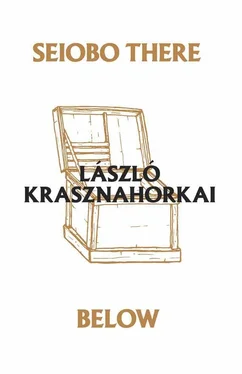HELL REALLY EXISTS
and below which it was repeated that, according to Benedict, who had recently spoken at a convocation in a northern district of Rome, it was an error to think, as more and more people did, that hell was just a kind of metaphor, an emblem, an abstraction; because, reported Benedict, it has a physical reality — this, the article on the front page of the Corriere della Sera, was what came into his mind, what an impossible situation, he thought, sitting two hundred meters away from me is someone who has followed me, someone who is watching me, and here I am, beside the Frari, with this idiotic thing in my brain, I’ve lost my mind; he tried to pull himself together, but he couldn’t because it then came into his mind that while John Paul II was of the opinion, as the Corriere stated, that heaven and purgatory were not really extant, Benedict went so far, continued the reporter, as to state with full emphasis at this convocation in the north of Rome that it was possible that heaven and purgatory did not really exist, but that hell did, moreover in the concrete physical sense, where the word, that is to say physical, had been set in italics, there in the daily mail of the occupants of the house on the little marble table; but what could this possibly mean, he thought, but only this much: well, let’s just stop here, what is this, so there’s no heaven, no purgatory, that’s fine, to hell with the whole thing, that’s fine — but he did not continue the thought, as suddenly a feeling arose that he was flirting imprudently with danger, a danger that possibly didn’t have any basis, but if this were not the case, then he was, with complete utter carelessness, flirting with it; he jumped up suddenly and set off for the narrow alleyway that ran alongside the apse of the Frari, but just as suddenly regretted doing so, turning back to the Campo dei Frari, and quickly crossed the square on the near side — in opposition to his plan, that is to say, actually, contrary to his intended direction, he turned into a back alley just as narrow and dark and damp and chill, in order to draw attention away from where he was really going, but he nearly ruined it, it shot through him; he nearly revealed against his own will where he was going with those resounding steps of the black oxfords, he nearly betrayed to his pursuer his destination; he himself hardly understood how he could have been so rash, but it’s fine now, he thought, calming down a bit, there is no way anyone could now tell where he was headed, which, as senseless as that might have seemed, still could be the case; that is, not to reveal where he was headed, inasmuch as there was no question whatsoever of pursuit, inasmuch as it was, however, a question of pursuit; it will all soon come to light, he kept looking backward in the alleyway; and so, as to allow that chance to occur, he stopped, trying to discern if he heard steps in the quiet that suddenly sprang forth from the silencing of his own hard-soled shoes, but he didn’t hear anything, only a small breeze struck him, coming in both directions from the damp walls; in any case, because he had to know if that character was on his trail again, he slowly began to move backward in the alleyway, cautiously, on tiptoe lest the shoe taps betray him yet again, and hiding his body behind the wall, he leaned out, looking out onto the square, but there was no one sitting on the other side at the little table beneath the sun-umbrella, on the contrary, he was nowhere on the square, he had disappeared, had been absorbed, evaporated, he stated to himself, and stayed there for a few moments longer, until he could cut across the small intersections without his heart jumping into his mouth — as he reflected, for a while, Pink-Shirt could pop up in front of him at any moment, surprising him at any one of these little intersections — but as one intersection came right after the next, and nothing of the sort occurred, he slowly began to calm down; he stopped, he listened, then after he turned and went back toward the Campo dei Frari, he found the square in exactly the same state as before, that is to say completely deserted, he now had the courage to turn definitively into his own alleyway, so that taking it he could reach the Scuola Grande di San Rocco, which was his goal, he went to the end of the Salizzada S. Rocco, which now did not seem as narrow as it had a moment ago, when no one at all was walking there, perhaps because now, as he turned into the alleyway, he caught sight of a few pedestrians who were already approaching from the opposite direction, from the San Rocco to the Frari, that is to say in the opposite direction to himself; in any event these few encounters, as each stray pedestrian passed by, felt as if someone were shaking him by the shoulders, saying wake up already, it’s all over, it was just a bad dream, don’t worry about it, that was his mood as he reached the Campo dei S. Rocco where nearly the whole of the little square was filled with sunlight, and there to the left stood the marvelous Scuola Grande di S. Rocco, for whose plan we can thank a certain master builder of the name of Bartolomeo Bon, although for the entire building itself — in other words the entirety of the San Rocco in all of its full glory — our thanks are due to Sante Lombardo and Antonio Scarpagnino, so that after 1549, Giangiacomo dei Grigi had nothing to do but finish it, that is to create the gestures still missing from the structure, so that it could stand in all of its beauty resplendent before the visitors, just as it stood today before him, who even at first went toward the iron gate of the plot of land facing the building and stood there, and turned around to gaze at this creation which in the opinion of all Venice-goers responds to the most exalted and perfect architectonic conception — simply to give himself over not only to the wonder, as he had already stumbled upon this, amazed, when he had been here for the first time, but to his memories as well, because it was, as a matter of speaking, about this too; it was for the sake of this that he had come to Venice, for the sake of this one single building, because once, when he had come here for the first time, he had been so overpowered there inside that in fact he had shuddered; he stood in the sunlight and looked at the elegant façade of the San Rocco, but his gaze strayed again and again to the entrance, where he himself would step inside, as he had stepped inside once before, but not now, he composed himself; now, for the time being, he had to catch his breath, free himself from the horrifying dream of just a few minutes before, to expel from his head this entire nightmarish pursuit, because really, looking at it from here, he thought — amid the smaller crowds of people that already, at the end of the siesta, were inundating here and there between the entrance and exit points of the tiny square — it seemed completely impossible that someone would start pursuing him as soon as he stepped out of the doorway of the pensione, some guy in a pink shirt, a ridiculous gangly sort with his strange S-shaped body, his collapsing knees, his head dangling forward, how could he even have imagined it, and even more so that this figure had targeted him, it was really totally absurd, he decided, because why the hell would anyone be looking for him in Venice, where he knew virtually no one, what reason could there possibly have been for anyone to trail him among the tens of thousands of tourists, especially him, who in the whole God-given world had no ties at all to Italy, let alone Venice, and moreover, he was not one of those who kept coming back here again and again, in pursuit of so-called illusory pleasures, giving himself over to the blank drift of superficial and frankly idiotic raptures — he was not in any way like one of them!? — actually he did not truly admire Venice: as far as he was concerned, Venice reminded him too much of a woman, for him, there was in Venice a kind of immoderate feminine delusion and fraudulence, no, this city was not his cup of tea, though of course he could not deny that it was truly beautiful, that there was in Venice an unparalleled beauty, this strange city — from the Ca’Doro to the San Giovanni e Paolo, from the San Marco to the Accademia, the Hotel Giorgione to La Fenice, and so on — but admiration was denied to him and he did not love Venice, he was instead afraid of it, the way he would be of a murderously cunning individual who ensnares his victims, dazing them, and finally sucking all the strength from them, taking everything away from them that they ever had, then tossing them away on the banks of a canal somewhere, like a rag; yes, this was how he now saw this laughable situation; he didn’t even come here very often, in the course of his long life this was the second time he had been here, and now, he thought, smiling at his own fears, what a crazy, terrifying, perhaps excessive, if he could put it that way, fantastical start, he was fortunate, he added to himself, completely relaxing now in the midst of the crowd, that he didn’t have to go to the Ca’Foscari or the Palazzo Ducale, nowhere at all, he didn’t have to budge from here, and a vaporetto wasn’t much so that he didn’t have to pay a lot; if he wanted, apart from the S. Rocco, he didn’t have to see anything of Venice — just the one single thing he had traveled here to see; the visitation of which was more important to him than his entire mediocre, senseless, barren, and superfluous life.
Читать дальше












